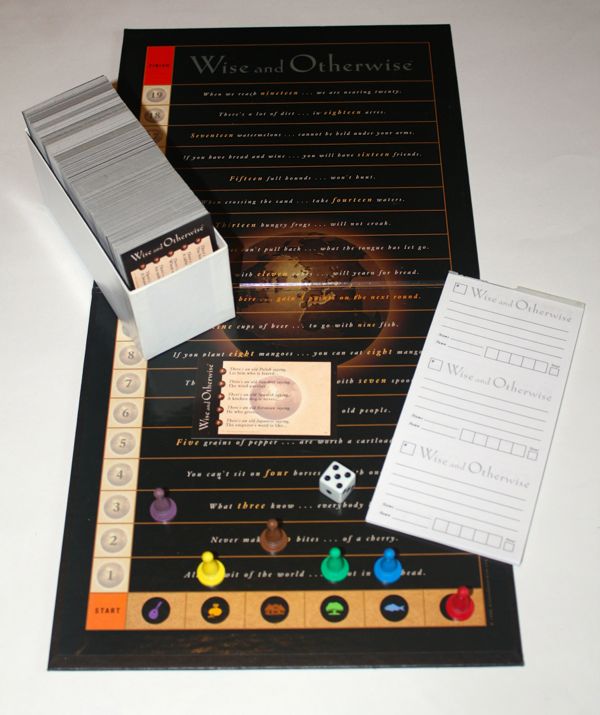The obvious question is this: Are you wise or otherwise? (Bah-dum-bum) Wise and Otherwise is a variation of the classic dictionary game that is more interesting than most.
Let’s take a look at what makes it so.
How Do You Play Wise and Otherwise?

First, you need several players. The more, the better, really. Technically, you can play with just two, but it’s no fun that way. Even 3 is pushing the lower limit.
The game as designed can handle 6 players, but it’s easy to add more than that.
One player each round is the Reader. As Reader, you take a card from the box and read one of the statements on the front side aloud to everyone.
That statement is the beginning of an old and usually ethnic proverb. The other players try to complete it on their “score” sheets. There’s nothing really special about these sheets. You can just as easily use small pieces of regular paper, as long as they are all the same size.
You, as Reader, have the correct completion of the proverb on the back of the card, which you write on your own paper.
When everyone is done writing, the Reader collects the papers, shuffles them, and reads each possible answer aloud.
Each player votes (aloud) on which answer he thinks is correct. The Reader makes note of each vote on the papers and awards points as follows.
If you guessed the correct answer, you get 2 points. If someone guessed your answer, you get 1 point. If no one in the group guessed the correct answer, the Reader gets 3 points.
The game ends when one person has moved up the board (see picture) to the opposite end. Usually that means he got 20 points. It is possible for someone else to win though, due to the scoring method described above.
What Makes Wise and Otherwise Better Than the Dictionary Game?
In the old dictionary game, instead of phrases on a card, you tried to find unusual words in the dictionary. Players then made up their own definitions of the word.
You had to make your definition sound like a dictionary definition or your answer probably wouldn’t get any votes.
With the sayings in Wise and Otherwise, there is almost no way for you to know the correct completion of the sentence, and you don’t need to worry about style. Yes, I’m saying you won’t get any style points no matter how you write.
A few examples from the actual game will help make my point here. Try not to peek at the answers right away. Imagine how you would complete each of these first.
“There’s an old Zanzibari saying, A good bird…”
“There’s an old Serbian saying, The more eggs…”
“There’s an old Egyptian saying, Life is a…”
“There’s an old Swahili saying, Where the trees are…”
And the answers, in order, are…
“…does not cry twice.”
“…the thicker the soup.”
“…dancing girl.”
“…there are no builders.”
Be honest now. Your answers weren’t even close, were they? But can you see how much fun this would be with a group of friends?
Check the pricing and availability of Wise and Otherwise at Amazon today!

